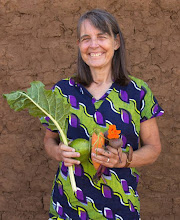Valuable home visits. . .
Last week I accompanied the health educators on home visits,
which always refreshes my perspective on the work that needs to be done to
improve the conditions of peoples’ lives here. As I sat with Claire on a hemp bag in the tiny,
dirt floored, mud- walled, tin-roofed shack, I could see a myriad of holes in
the roof, which appeared like constellations on a moonless night. Claire was
incredible, her empathetic listening skills giving the woman a safe and
comfortable place while eliciting intense and heartfelt conversation as the
mama shared her travails of vulnerability and poverty.
At one point during the conversation, Claire paused
and translated the woman’s words, “Being able to talk about depression is
better than receiving money”. This profound statement held so much poignancy,
especially in the context of sitting with this woman in her home who
unquestionably qualifies as among the ‘poorest of the poor’ strata. It was
amazing to think that we could begin to make a difference in this woman’s
impenetrable emotional despair. Her statement completely affirmed that GHI’s
newly introduced a unit on mental health to our health and training curriculum
is certainly vital.
The mental health of mothers has to be targeted as a
key variable when attending to the complex and interrelated factors that lead
to malnutrition.
A recently published article, http://www.globalpost.com/dispatches/globalpost-blogs/commentary/rich-or-poor-depression-growing-global-crisis
discusses that depression is a growing global crisis across all economic
classes. “Psychiatrists can play an important role in improving global mental health
— not just as physicians — but as advocates, strategists, and teachers. We must
find ways to expand access to mental health care through community-based
services and primary care. We must train local clinicians, even non-clinicians,
to identify and treat patients with mental disorders, and we must work with
local governments and community leaders to prioritize mental health care and
reduce stigma.” It’s good to know our
work at GHI in this realm is contributing to easing the burden of depression
and other mental health issues.
Besides providing a chance during home visits for these mothers to confide their
individual problems and challenges, reinforcement of key messages from
trainings to date, answering questions and providing clarity to issues is also
a focus. Nutrition, family planning and mental health appear to be the
trainings that spur the most dialogue.
Everyone visited had the printed handouts from the
trainings close at hand for reference and some of them had nailed on the wall. Accompanying
our extraordinary health educators on home visits is one of my favorite aspects
of my work here. I love witnessing the development of their skills and the
respect they hold as leaders within the community.
News Flash!
Direct from the Gardens for Health website:
“Julie Carney, GHI’s incredible Country Director, was
recently named an Ashoka Fellow. This is exciting news for both Julie and
Gardens for Health! This prestigious fellowship recognizes the world’s leading network
of social entrepreneurs – extraordinary change makers who find new solutions to
social problems. As GHI has been lucky enough to witness firsthand, Julie is
the definition of a change maker.”
Congratulations, Julie, we are so proud that you have
received this well deserved recognition and opportunity.
Helen
A home in the hills.
Brewing storm, hope it doesn't occur
during our Thanksgiving feast day.
Claire on the home visit circuit.
Claire reviewing mental health training.
Naomi provides the mama a great
chance to share some concerns.
Naomi reinforces health trainings.
Home visit with Naomi.
Helen teaching the field team how to
tie a bowline for hanging scales.
Heading home after a few kilometres of walking.
Mama and children in a very humble abode.
Innovations. . a torn mosquito net
being used as chicken coop.
Lunchtime at the new tables.
Congratulations to Julie, recently
announced an Ashoka Fellow.



























.jpg)












